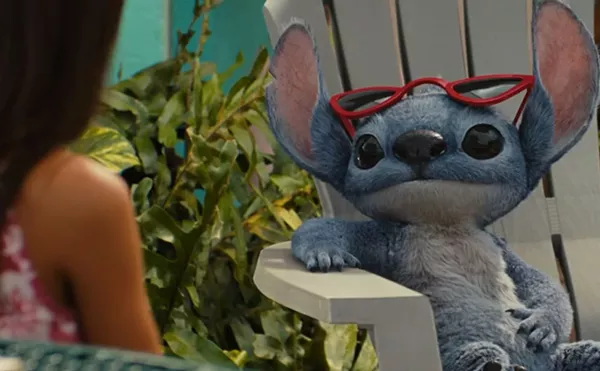
Audio By Carbonatix
[
{
"name": "GPT - Leaderboard - Inline - Content",
"component": "35519556",
"insertPoint": "5th",
"startingPoint": "3",
"requiredCountToDisplay": "3",
"maxInsertions": 100,
"adList": [
{
"adPreset": "LeaderboardInline"
}
]
}
]
Director Quentin Tarantino sports blue-green hospital scrubs as he explains why the extinction of back-lot studios and traditional B-movies represents a big loss to American cinema. Later, when he and Grindhouse co-director Robert Rodriguez shift from a 14th-floor room to poolside at the Beverly Hills Four Seasons, Tarantino adds a leprechaun-green sports coat to the mix. Rodriguez wears a black cowboy hat. Together they are Hollywood's definitive odd couple.
"I understand why things change, the reason for them changing precisely on the price of tickets," Tarantino says, his nasal voice especially raspy today. "It was different when they cost $3.50 or, at the most, $5. You could pay to see a cheap Jaws rip-off and pay the same money to see A Star Is Born. Now you're talking $10 or $12. It doesn't make the same sense."
Legendary B-movie director Roger Corman — a man all too familiar with grindhouse movies' low-budget, ultraviolent, ultrasexualized style — always "knew what would happen in that market two years before it happened," Tarantino continues. "So when all of a sudden his movies weren't playing theatrically anymore, they were just going straight to video — I was working at a video store at the time — I thought, 'Oh, man, this is the end. If he's doing it now, that's just the way it's going to be.'"
Tarantino isn't done answering the question, though. He's long-winded, loquacious. Later in the afternoon, Grindhouse star Kurt Russell calls the filmmaker a savant and declares he would bet $1 million on Tarantino in a movie trivia contest any day of the week. In other words, Tarantino knows his shit and, if anything, has to internally edit his essay-length answers.
"Were there any good movies made during that transition?" Tarantino asks himself with a shrug. "A couple. But when you didn't have the chance for theatrical exposure, something was really lost in the equation. Not that these movies ever really got good reviews, but there was a chance. There was that chance that [film critic] Kevin Thomas of the Los Angeles Times could like it and you could get a good review . . . and then you would be known and maybe go on from there. But when it goes straight to video, that chance doesn't exist anymore."
Tarantino and Rodriguez found inspiration in the guerrilla filmmaking behind the '70s grindhouse movies that created classic, low-rent cinematic subgenres ("women in prison," for instance). There was something there that spoke to their inner comic-book geeks. There was beauty in the inherent "badness" of movies made on the run. That's why they set out to pay homage to the era with Grindhouse, a bloody double feature of Rodriguez's horror flick Planet Terror and Tarantino's slasher showdown Death Proof. If anybody else in Hollywood had pitched such, they'd have been laughed off the studio lot, but apparently these two still haven't figured out how to play by the rules.
"People would tell me with El Mariachi, 'You can't be your own [director of photography],'" Rodriguez says, surprisingly soft-spoken compared to Tarantino's emphatic speech and loud outbursts. "I wasn't smart enough to know I couldn't do it. Had I known that you couldn't do it, I probably wouldn't have. I always wanted to keep that sort of innocence about [filmmaking]."
"You know, one of the things about me, I'm very knowledgeable about film structure, the conventions of it — and not just American cinema. Italian and Japanese too," Tarantino adds. "But when it comes time to write my movies, as much as I'm trying to make it cinematic or this or that, when I'm writing it, it really is about the page. I don't really follow movie rules. I follow novelistic rules. And you know what? There are no such things as rules in a novel. An author can do any goddamn thing he wants to do, any way he wants to do it. I always just demanded the same freedom as a screenwriter, and I think my scripts, when you read them, they are novelistic in a way."
Rodriguez jumps in when pressed if they intentionally challenge the way movies are traditionally made and marketed: "It's really a self-challenge. With [Sin City], I didn't know if audiences were ready for that. I just thought it was something I really needed to do, something I really wanted to see. And I was really prepared for people not to get it at all. It's black and white, it's an anthology, it's all voiceover. It could have easily been a failure, but I just felt I needed to take the challenge. You almost don't want to do anything safe, because it kind of bores you."
Tarantino agrees, and can't help but cite his 1994 high-water mark Pulp Fiction — the movie that made him and generated debate about its time-shifting style. "I never think of it as a sensationalistic parlor trick," he says of his devices. "I'm a storyteller, and there's nowhere I can't go with it and no way I can't tell it. Yes, I go back in time as far as telling my story, but if it's more effective to tell it beginning to end, I'll always tell it that way. I want it to be dramatically engaging."
Rodriguez lights up when asked if more Grindhouse double features are planned. This one will be "the first of many Grindhouses," he insists. "We have so many ideas."
"I think we wanted to start off first in the horror genre," Tarantino says, equally excited. "But part of our thing is to hopefully explore other grindhouse genres. I've always wanted to do a spaghetti western. I've always wanted to do a blaxploitation movie, even a women-in-prison movie. You can just go on and on."
Cole Haddon is a freelance writer for Metro Times. Send comments to letters@metrotimes




